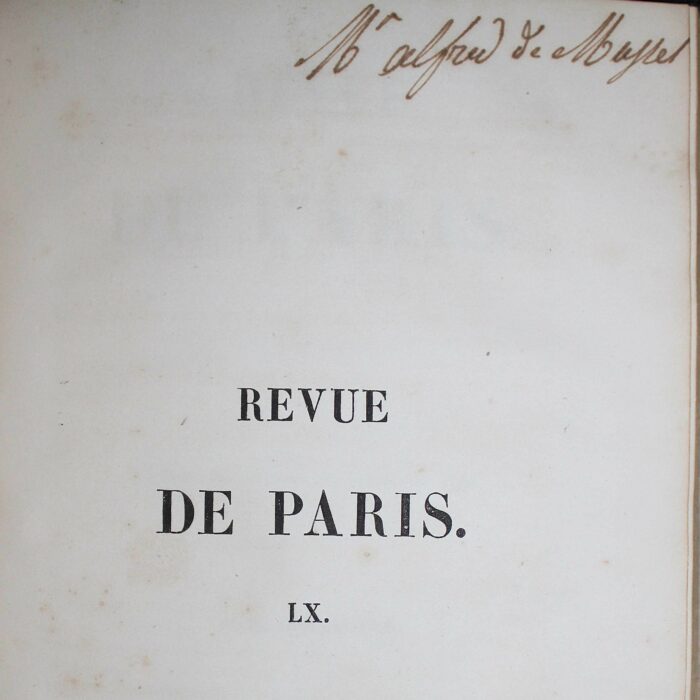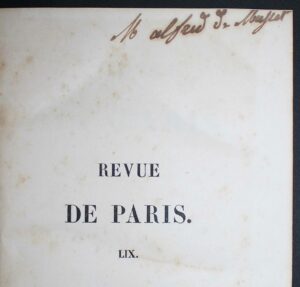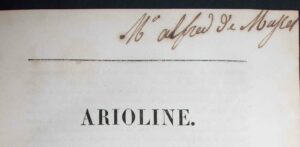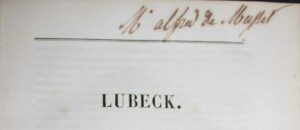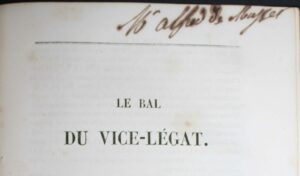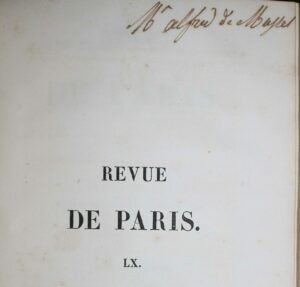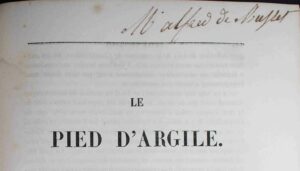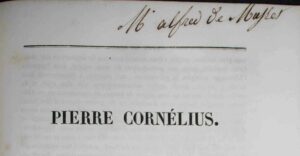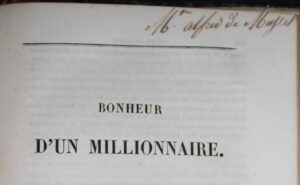Revue de Paris. Nouvelle série ; – Année 1838. Tome cinquante-neuvième [-soixantième]. Paris, au Bureau de la Revue, 1838. November and December in 1 vol. in-8°. 291, [1] pp. ; 367, [1] pp. Contemporary fawn half-sheepskin, smooth spine decorated with double gilt fillets, gilt title and date, red speckled edges.
Alfred de Musset signed 8 times, probably to the bookbinder : in volume LIX, on the half-title and on pp. 81, 153, and 224 (the 1st leaves of signatures 1, 6, 11, 16); and in volume LX, on the half-title and on pp. 153, 229 and 297 (the 1st leaves of signatures 1, 11, 16 and 21).
What probably made these two publications so dear to Musset, who presumably had the two months bound and took care to sign them, is that they contain reviews of Rachel’s beginnings at the Théâtre-Français, followed by a magnificent article devoted to her by A. de Latour (pp. 269-282), and those of the future Pauline Viardot, then Pauline Garcia, an equally eulogistic article signed P. de M., initials of Paul de Musset, Alfred’s own brother (pp. 291-294). The latter, unable to attend the concert, had assumed its quality ‘according to [his] brother’s account’, as he wrote to Mme Jaubert. The poet courted the two young actresses, both aged 17. As his brother Paul note it: ‘Alfred always had to be in love, and he always was […] His double admiration for Pauline Garcia and for Rachel passed from his mind to his heart, as he left the theatre, every time he heard them…’.
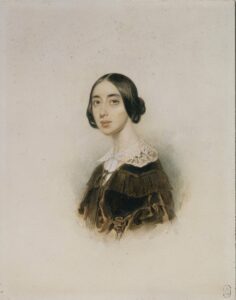


He was rejected by Pauline, but was more successful with Rachel, with whom he had an affair. Musset published three articles in La Revue des Deux-Mondes praising the beginnings of the two artists: on 1 January 1839: « Concert de Mademoiselle Garcia », then the following November 1st : « De la Tragédie. A propos des débuts de Mademoiselle Rachel », and « Débuts de Mademoiselle Pauline Garcia au Théâtre-Italien ». He dedicated several poems to them, including :« Sur les Débuts de mesdemoiselles Rachel et Pauline Garcia » (Poésies nouvelles), published in La Revue des Deux-Mondes on 1 January 1839, verses composed at the end of 1838, as the poet implied. Note the fiery verses that Alfred brought to Rachel in the summer of 1839: « A Mademoiselle Rachel » (« […] Cette langue de ma pensée, / Que tu connais, que tu soutiens, / Ne sera jamais prononcée / Par d’autres accents que les tiens. // Périsse plutôt ma mémoire / Et mon beau rêve ambitieux ! / Mon génie était dans ta gloire ; / Mon courage était dans tes yeux », Poésies posthumes.)
Revue de Paris also publishes, in these two volumes of November and December 1838, writings by X. Marmier and Delécluze, literary criticism, political bulletins (such as the acerbic criticism of Guizot : « Les dévotions politiques de M. Guizot » by Pickersghill), Jules Sandeau’s glowing account of the Ruy-Blas by Victor Hugo created at Théâtre de la Renaissance (« M. Hugo n’est pas et ne sera jamais le poète de la réalité. Son génie ne sait ni marcher ni parler ; mais il chante et il a des ailes »), and Ernesta Grisi’s difficult beginnings in Norma, followed by the performance of her cousin Giulia Grisi, full of energy and pride in the role of Elisabeth in Donizetti’s Robert Dévreux, first performed at the Théâtre des Italiens on 27 December. The poet had published La Nuit vénitienne in Revue de Paris in 1830.
Signature sometimes trimmed short, tear not missing vol. LX p. 253, discreet restoration to binding.
2 500 €
